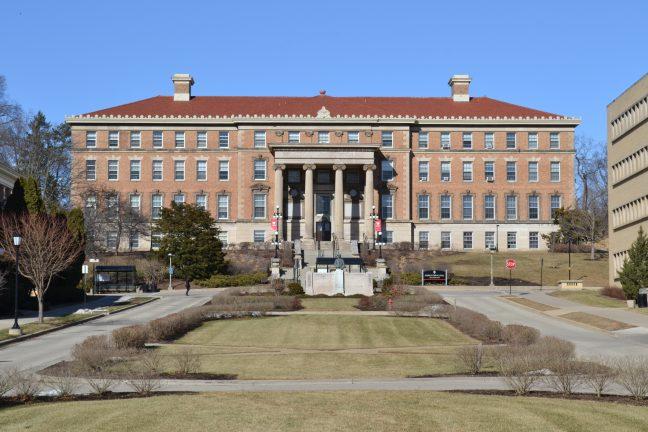University of Wisconsin scientists recently received a grant to research ways to improve cultivars in cranberries and blueberries in an effort to use fruit genetics to innovate Wisconsin’s agriculture industry.
According to a College of Agriculture and Life Sciences news release, UW professor Amaya Atucha and associate professor Juan Zalapa are part of a team who received the grant from the USDA to improve the quality of cranberries and blueberries. The Vaccinium Coordinated Agricultural Project received a four-year grant of $6.4 million from the USDA, with another $6.4 million from matching funds, to fund their research
The VacCAP is hoping to improve the quality of blueberries and cranberries because Wisconsin is very involved in the cranberry industry, according to the CALS news release. Atucha said improving the quality of the fruit is necessary because different products require different characteristics of cranberries.
“For producing sweetened dried cranberries, you need fruits [that] are firm and their full color [which] is not the same requirements as juice,” Atucha said. “You need to press the [cranberries] and collect the juice.”
UW, state legislators look to assist struggling Wisconsin farmers
According to the CALS news release, the industry shifted from juice to sweetened dried cranberries, so the demand to produce different qualities in fruit is essential to the industry. Atucha explained directions of producing cranberries in the industry are key to understanding why the demand for cranberries shifted in recent years.
Atucha said there are 20,000 acres of cranberries in Wisconsin, and the shifts in demand can be attributed to pressure placed on the market due to changes in consumers’ tastes. Products made of out cranberries have changed due to changes in consumer preferences, Atucha added.
“A lot of people drank cranberry juice, but the appearance of new products such as sweetened dried cranberries became popular… [now] most of the production of cranberries goes into producing sweetened dried cranberries,” Atucha said.
Currently, the research to develop better cultivars is not available for blueberry and cranberry breeders, according to the CALS news release. The VacCAP project is looking to identify genetic factors that contribute to the fruit’s characteristics, like texture and appearance.
Zalapa said the goal of the project is to look at traits and associate them with the genetic components in the chromosomes.
“Then, in the future, we can select cultivars based on the genetic markers instead of the phenotypic traits, or the outer appearance of the cranberries,” Zalapa said.
Through using DNA tools, the breeders of the berries will be able to select desired qualities for certain products. Atucha said with this new technology and understanding of berries’ genetics, breeders can incorporate those qualities into new cultivars.
Atucha said the research will primarily focus on the sweetened dried cranberries and their traits.
“The research that we’re working on [is] identifying specific traits related with the quality to make better sweetened dried cranberries,” Atucha said. “We’re trying to look specifically at genomic and genetic resources to allow us to identify some of those traits.”
Atucha said the implications of the research project will affect farmers in Wisconsin by increasing the amount of quality fruit harvested.
Since some of the cultivars farmers currently have do not necessarily have traits needed to make good sweetened dried cranberries, Atucha said this research will have an impact on how Wisconsin farmers reap the most profit from their harvest by using genetics to increase the quality of the fruit.
“By finding out and developing new cultivars, we can improve the quality,” Atcuha said. “The growers are going to have better fruit [which] will impact their profit.”
Zalapa explained this research is relatively new since cranberry breeding has not been researched in the past. Zalapa explained this is because breeding cranberries was viewed as not important compared to other crops.
From the 1930s and 1960s, Zalapa said there was a lot of research on crop breeding, but there was a gap because nobody was doing research on cranberry breeding and genetics.
“There was a lack of cranberry research because cranberries were not super valuable,” Zalapa said. “ We’ve always concentrated on corn, soybeans and other major food crops… There weren’t many cranberry growers, but as the crop became important then there was an interest in producing cranberries.”
Atucha and Zalapa both said there are many close comparisons between cranberries and blueberries. Atucha said there are some blueberries in the state, but not as much as cranberries.
Though, Atucha explained the key in comparing the genomes is in the fact cranberries and blueberries are almost like cousins since they come from the same family.
“There are differences such as sugar and acid profile between cranberries and blueberries, but at a genetic level there are a lot of similarities,” Zalapa said.
By looking at the genetic makeup of the fruit, Zalapa and Atucha along with the other VacCAP project contributors hope to help growers of both cranberries and blueberries select specific cultivars that can provide better quality cranberries and ultimately innovate their farming techniques to capitalize their profit.


















